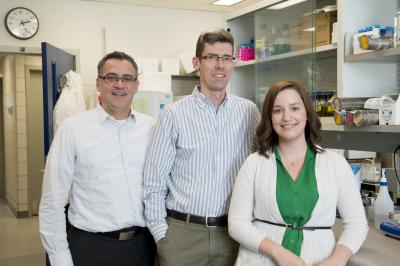Study shows how streptococcal bacteria can be used to fight colon cancer

Western University researchers Dr. David Hess and Dr. John McCormick and lead author Kelcey Patterson show how the bacteria primarily responsible for causing strep throat can be used to fight colon cancer. By engineering a streptococcal bacterial toxin to attach itself to tumor cells, they are forcing the immune system to recognize and attack the cancer. Credit: Schulich School of Medicine & Dentistry, Western University
By engineering a streptococcal bacterial toxin to attach itself to tumour cells, they are forcing the immune system to recognize and attack the cancer.
Kelcey Patterson, a PhD Candidate at Western and the lead author on the study, showed that the engineered bacterial toxin could significantly reduce the size of human colon cancer tumours in mice, with a drastic reduction in the instances of metastasis. By using mouse models that are stripped of their immune system, they were able to create a 'humanized mouse' – one that would not only grow human colon cancer cells, but would also support a human immune system, to test the anti-cancer immunotherapy.
The work was directed by John McCormick, PhD, an Associate Professor in the Department of Microbiology and Immunology and Scientist at the Lawson Health Research Institute. “Our team has been studying these bacterial toxins called 'superantigens' for their role in bacterial infections. But we are now utilizing the power of these toxins to re-direct the immune system to go after cancer cells.”
McCormick says their research provides important pre-clinical evidence that this may work in humans. “This work represents a 'next-generation immunotoxin' that we hope will eventually lead to a new class of cancer therapeutic.”
The research was funded by the Canadian Institutes of Health Research. Jennifer Dixon Pittaro, Peter Bastedo, David Hess and Mansour Haeryfar all contributed to the paper entitled “Control of established colon cancer xenografts using a novel humanized single chain antibody-streptococcal superantigen fusion protein targeting the 5T4 oncofetal antigen.”
McCormick and his colleagues have now received a new grant from the Cancer Research Society to develop different toxin and antibody combinations to fight other types of cancer.
Media Contact
More Information:
http://www.uwo.caAll latest news from the category: Health and Medicine
This subject area encompasses research and studies in the field of human medicine.
Among the wide-ranging list of topics covered here are anesthesiology, anatomy, surgery, human genetics, hygiene and environmental medicine, internal medicine, neurology, pharmacology, physiology, urology and dental medicine.
Newest articles

Machine learning algorithm reveals long-theorized glass phase in crystal
Scientists have found evidence of an elusive, glassy phase of matter that emerges when a crystal’s perfect internal pattern is disrupted. X-ray technology and machine learning converge to shed light…

Mapping plant functional diversity from space
HKU ecologists revolutionize ecosystem monitoring with novel field-satellite integration. An international team of researchers, led by Professor Jin WU from the School of Biological Sciences at The University of Hong…

Inverters with constant full load capability
…enable an increase in the performance of electric drives. Overheating components significantly limit the performance of drivetrains in electric vehicles. Inverters in particular are subject to a high thermal load,…





















